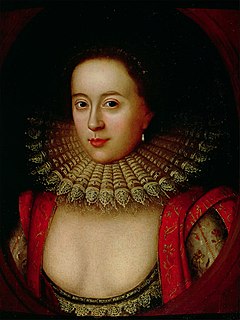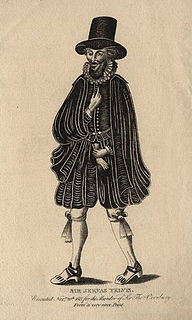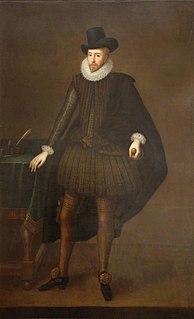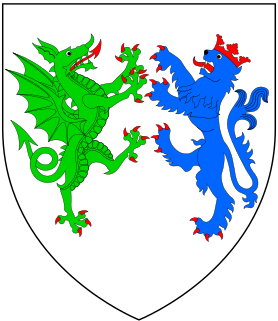
Sir Thomas Overbury was an English poet and essayist, also known for being the victim of a murder which led to a scandalous trial. His poem A Wife, which depicted the virtues that a young man should demand of a woman, played a large role in the events that precipitated his murder.

Robert Carr, 1st Earl of Somerset, was a politician, and favourite of King James VI and I.

Chipping Campden is a small market town in the Cotswold district of Gloucestershire, England. It is notable for its elegant terraced High Street, dating from the 14th century to the 17th century.

Frances Carr, Countess of Somerset, born Frances Howard, was an English noblewoman who was the central figure in a famous scandal and murder during the reign of King James I. She was found guilty but spared execution, and was eventually pardoned by the King and released from the Tower of London in early 1622.

Mickleton, with a population of 1,677, an increase of 125 since the census of 1991, is the northernmost village in Gloucestershire, England.
Wrongful execution is a miscarriage of justice occurring when an innocent person is put to death by capital punishment. Cases of wrongful execution are cited as an argument by opponents of capital punishment, while proponents suggest that the argument of innocence concerns the credibility of the justice system as a whole and does not solely undermine the use of death penalty.

Norman Jewson was an English architect-craftsman of the Arts and Crafts movement, who practised in the Cotswolds. He was a distinguished, younger member of the group which had settled in Sapperton, Gloucestershire, a village in rural southwest England, under the influence of Ernest Gimson. Surviving into old age, he brought their ideas and working methods into the second half of the twentieth century. His book of reminiscences has become established as a minor classic of the English Arts and Crafts movement. His repair of the Tudor Owlpen Manor in 1925–26 is often regarded as his most representative and successful work.
Linda Stratmann is a British writer of historical true crime, biography and crime fiction.
Conviction for murder in the absence of a body is possible. However, cases of this type have historically been hard to prove, often forcing the prosecution to rely on circumstantial evidence, and in England there was for centuries a mistaken view that in the absence of a body a killer could not be tried for murder. Developments in forensic science towards the end of the 20th century have in recent decades made it more likely that a murder conviction can be obtained even if a body has not been found.
Events from the 1610s in England.
Robert Harris (1581–1658) was an English clergyman, known as a Puritan preacher, member of the Westminster Assembly, and President of Trinity College, Oxford.

Sir Gervase Helwys, also known as Jervis Yelwys, was a Lieutenant of the Tower of London found guilty of complicity in the murder of Sir Thomas Overbury and hanged in 1615. The scandal provoked much public and literary conjecture and irreparably tarnished King James I's court with an image of corruption and depravity. There are variations in the spelling of Helwys: Helwis, Helwiss, Helewyse, Helwysse, Yelwys, Ellowis, Elwys, Elwis, Elvis, Elwes, and Elwaies.
Sir Christopher Turnor was an English judge, knight and royalist.
North Cotswold Community Radio is a non-profit community internet radio station serving primarily the North Cotswolds and the surrounding area in west-central England.

Elisha Smith Robinson (1817–1885) was an English businessman and politician.

Baptist Hicks, 1st Viscount Campden was an English merchant and politician who sat in the House of Commons between 1621 and 1628. King James I knighted Hicks in 1603 and in 1620 he was created a baronet.

John Greville was a Member of Parliament for Gloucestershire in seven parliaments.

John Tame of Cirencester and of Beauchamp Court in the parish of Fairford, both in Gloucestershire, England, was a wealthy wool producer and merchant who re-built the surviving St. Mary's Church, Fairford, the former structure of which had been built by one of the Beauchamp Earls of Warwick in the 15th century. The 28 magnificent Fairford stained glass windows he installed in the church are considered amongst the finest and most complete in England. He and his son Sir Edmund Tame (d.1534) so fostered the trade transacted at Fairford, that it came to rival that of the nearby long-established town of Cirencester, which increase was remarked upon by his contemporary the antiquary John Leland (d.1552): "Fairford never flourished afore the cumming of the Tames into it".

William Greville, of Chipping Campden in Gloucestershire and a Citizen of the City of London, was a prominent wool-merchant and is the ancestor of the present Greville Earls of Warwick. The Latin inscription on his ledger stone in Chipping Campden Church, which he rebuilt at his own expense, describes him as flos mercatorum lanar(iorum) tocius (totius) Angli(a)e, "the flower of the wool-merchants of all England". This language is reminiscent of that used to describe certain prominent knights such as Edward, the Black Prince (d.1376) who was described by Froissart as la fleur de toutte chevalerie dou monde and was likely intended to suggest a degree of equivalence between mercantile and martial activities". He was amongst the richest and most influential wool merchants of his era and was the leading purchaser of wool from the Cotswold Hills.

The Anglican Church of St James at Chipping Campden in the Cotswold District of Gloucestershire, England was built in the 15th century incorporating an earlier Norman church. It is a grade I listed building.












